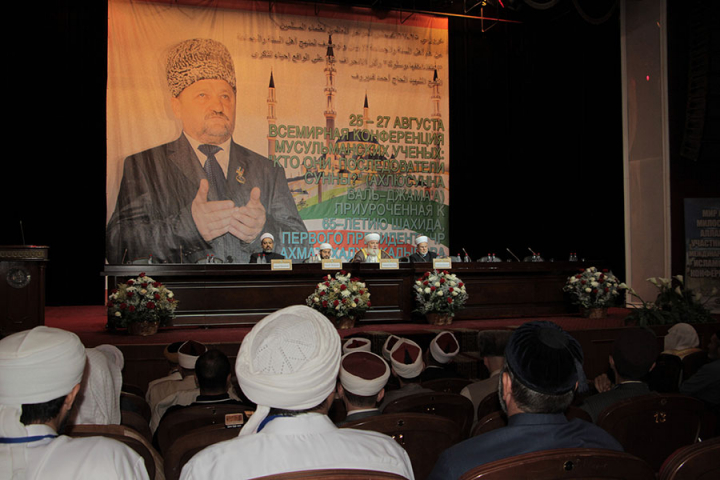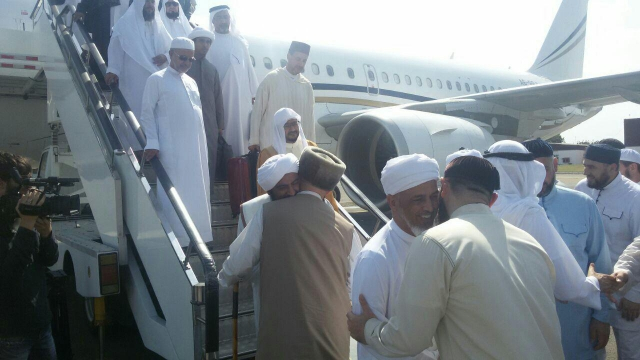In August 29, the representative congress of Muslim scholars, entitled "World Islamic Conference “Who are they, the followers of the Sunnah” finished its work in Grozny (Chechen Republic). More than 100 participants from 30 countries, especially from the Russian Federation, (almost all of them were muftiates, including the Mufti of occupied Crimea), as well as from Syria, Egypt, Libya, Kuwait, etc. have participated in the conference. The most representative delegation was from Egypt – it includes even supreme imam and Sheikh of the University "al-Azhar" Muhammad Ahmad al-Tayyib, its rector Ibrahim al-Gudgud, Mufti of the state Shawki Allyam and other important figures. A lot of famous preachers, including Sheikh Saeed Fuda from Jordan, also took part in the event.
The conference, dedicated to the 65th anniversary of Akhmad-hadji Kadyrov, was held with a wide scope that was quite usual for Chechnya. The children were ranked hanging the Korans, in such way they met the participants getting out of the aircraft. All the way from the airport, the locals welcomed them with Russian and Chechen flags. It became similar to the Russian Federation to hold such events. For already several years, Muslim scholars have been participating in "World Muslim Forum" that was established several years ago by the head of Russian Council of Muftis, Ravil Gainutdinov. But that was the first time the event was of such wide scope.
The conference in Grozny aroused interest far beyond the region, in fact all over the Muslim world, primarily, because of the resulting document, in which participants tried to give a clear answer on the question: who belongs to the Sunni and who doesn’t? However, according to the participants (in particular, the Mufti of Moscow Ildar Alyautdinov), it was impossible to include corrections in the already prepared resolution, so the “final” document hadn’t been adopted, and the work on it has been continuing after the event. The document, which has already appeared in Russian and Arabic languages, determines that the Sunnis officially include Ash'arites and Maturidi, four madhhabs, Sufi tariqah, and all sorts of sects ("Wahhabis", "Habashites" and others) that are defined as "misguided". Also, the definition of "misguided sects" was applied for "Muslim Brotherhood", "Hizb ut-Tahrir," Daesh (ISIL) and others. In general, the resolution reflects the Russian concept of so-called "traditional Islam", which meets the support and assistance from the state, and is opposed to all other Islamic movements.
The event is more interesting, perhaps, by its reflection of certain tendencies in relations between Russian Muslims with coreligionists of other countries than by its conclusions. It is known that the Russian authorities have significantly stepped up the "Islamic vector" of their activity in recent years: the opening of the mosque in Moscow (September 2015) was held in a big way, the main Muslim organisations supported the military operation in Syria almost unanimously, considerable resources are invested in creating a positive image of Russia as a state that is devoted to "traditional Islam" nothing less than to "canonical Orthodoxy." Recently, the deputy chairman of the Russian Mufties Council, Damir Mukhetdinov, called the Muslim Spiritual authorities of the Russian Federation as the “spiritual special forces of Vladimir Putin”. It is interesting, however, that neither the head of the Russian Council of Muftis, Ravil Gainutdinov, nor the head of the Central Spiritual Administration of Muslims, Talgat Tajuddin, visited Grozny (although they have sent delegations). To some extent, it follows from competition with the Caucasus, as the authorities of the Chechen Republic have been trying for a long time to make their region the "centre" of Russian Islam.
Statements, claimed by the participants of the conference, focused primarily on condemning the "extremist groups" and recognizing the Sufi tariqah as the movements of Sunni Islam. Again, many analysts saw a political context in it as the most representative delegations came from countries that had close relations with Russia. In particular, there is Egypt, where Sisi military dictatorship has achieved a significant loyalty from the religious establishment, and some authorities such as Sheikh Ali Jumaa (also was present at the conference) justified the killing of peaceful protesters. The Syrian scholars, who are close to Bashar al-Assad, also participated in the conference. But there were no representatives from Turkey and Saudi Arabia. Turkish delegation was absent, first of all, because of the complexity of the Russian-Turkish relations, Saudi Arabia – due to religious reasons, because the ideology of Saudi Arabia is Salafism (that was condemned in the resolution project).
Western news agencies haven’t reported a lot about the conference (except CNN Arabic service). Though, the same can't be said about the Arab media. There have already appeared the articles analyzing critical statements, in particular the "Chechen conference: policy of exclusion " by Ziyad al-Shami ("Al-Muttamar Shishan: Siyyasa al-Iksa") for the news agency “Al-Moslim.Net”. With regard to this or other materials we can see that Saudi scholars were the first who condemned the statements of the conference, in particular, analyst Jamal Hashkedzhi, two Sheikhs Alyauvi Al-Saqqaf and Muhammad al-Saidi, as well as the leader of the Kuwaiti Party "Ummah", Hakim al-Mutayri. Even the Syrian Sufi preacher, Hasan al-Dugim, urged not to consider the conference as a representative one, speaking in defense of the "Salafi brothers who are closer to us than Putin's scholars". Many statements, of course, condemned the Russian actions in Syria: "Did the participants of the Conference asked Putin to stop bombing Sunnis in Syria? Or, perhaps, those, who are under the bombs, are no more Sunnis for them?" — Rhetorically asks Saudi Sheikh Saeed al-Burayk. It is predictable that the event was covered in a positive light by Arabic-language version of the channel "Russia Today", the official news agencies of Syria, Egypt and even Iran.
In general, the conference in Grozny revealed again a number of deep contradictions in the modern Muslim world. In such context geopolitical axis Egypt — Syria — Iran – Russia is quite indicative (though it is not strong enough, but has noticeable contours), as well as the concrete local conflicts in the Russian Federation (between the "traditional" Islam and its opposition), in Egypt (between the military junta and the "Muslim Brotherhood" with Salafis), in Syria (between Assad regime and Sunni opposition). However, an attempt to exclude Salafism from the right "Sunni" Islam was doomed to face the criticism. Not just because of the influence of Salafis, but also because of the very wide definition of the term, which already includes a number of directions ("political "Salafism," apolitical Salafism" and others.). Judging by the reaction to the resolution of the conference in Grozny, which was gently criticized even by some participants, including the already mentioned Mufti of Moscow, the document has not received support outside the circles in which it proposed to be adopted. Unfortunately, instead of the desired intra-islamic dialogue, which is so necessary (but it is difficult to hold even in the one particular country), the issue is that Muslim movements are in opposition to each other due to the influence of the secular authority. In practice, the consequences of such policies are often searches, allegations of "extremism" and other forms of repression aimed at the "wrong" (in terms of power) Muslims. Incidentally, we observe such situation now in the occupied Crimea. Speaking against the "politicization" of Islam, many Muslim leaders are drawn into politics, moreover, which is secular and pragmatic. The doctrines (about "right" or "wrong" understandings) don’t play an important role by itself here but its use as a kind of "loyalty features," belonging to certain groups, are important now. We can only hope that, despite the importance of the conference in Grozny, sooner or later, other similar activities will be held and will not exclude any Muslim groups of Sunni semantic boundaries, but, call for an open dialogue independent of political preferences.



